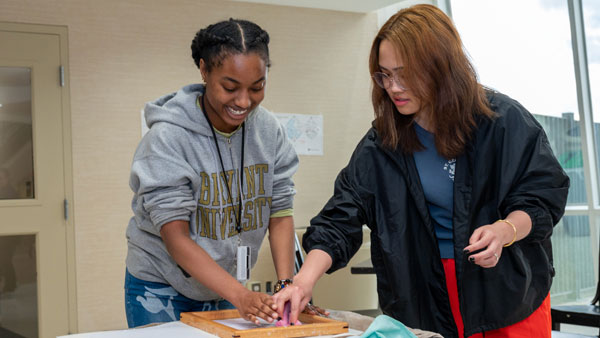Paulina Herrera ’26 submerges a mould and deckle into a bin of water and scoops paper and flax fibers into the wooden frame’s mesh screen. Lifting the papermaking tool just above the water’s surface, she gently shakes the frame and waits for the excess water to trickle into the bin. Once the drizzling stops, Herrera moves the sheet of pulp to a table where she captures the remaining water droplets with a sponge and removes the mould and deckle to reveal a handmade sheet of paper created from recycled materials.
It’s the last week of classes and Herrera and other members of the Women’s Leadership Living Learning Community (LLC) gather in the Unistructure’s Rotunda for a hand papermaking session with Terri Hasseler, Associate Dean of the College of Arts and Sciences. For the past semester, Hasseler worked with first-year LLC members on climate justice and socially engaged art practices. The women learned how heat waves disproportionately affect poorer communities, how people of color are impacted by discriminatory redlining practices, and how climate change impacts women more significantly than men.
“We’ve also looked at sea ice and how different indigenous communities, like the Inuit community, talk about the right to be cold; the loss of sea ice and snow changes their culture entirely,” says Hasseler.
In mid-April, LLC members collected approximately 400 comments on climate anxiety, climate hope, and climate despair from Bryant’s community. The responses are being stored in a card catalog as a part of a socially engaged art display on the library’s first floor, which the campus community is invited to view.

Prior to papermaking, students heard from several eco-centric artists and LLC member Taylor Vahey ’23, who spoke about the green talent shortage and climate’s impact on the business world. On Monday afternoon, the women also finalized a group statement on social justice and climate. Once the group’s sustainable paper dries, they will print their statement on the sheets, which will be displayed around the university.
“This class has educated me on the existence of environmental racism and about eco-ableism," says Mary Holland ’26. “It challenged my beliefs about small changes and individual action in the big problem of climate change and gave me a lot to think about in the wide range of solutions.”
In addition to asking others to reflect on climate change, LLC members each wrote a climate autoethnography examining who they are in relation to a community and how that community talks about climate justice. Topics ranged from religion’s connection to climate, climate change’s relation to people with disabilities, and how dirt bikes impact the earth.
On May 9, Hasseler’s students will conclude their semester with a rewilding project in a 20 by 20-foot space behind Bristol House. They will create a campus pollinator garden and incorporate indigenous plants to attract native species.
Just like their garden, the women’s climate justice work is only growing by raising community awareness. “There are solutions to climate change — it’s just a matter of getting people on board,” says Lilly Mallory ’26.